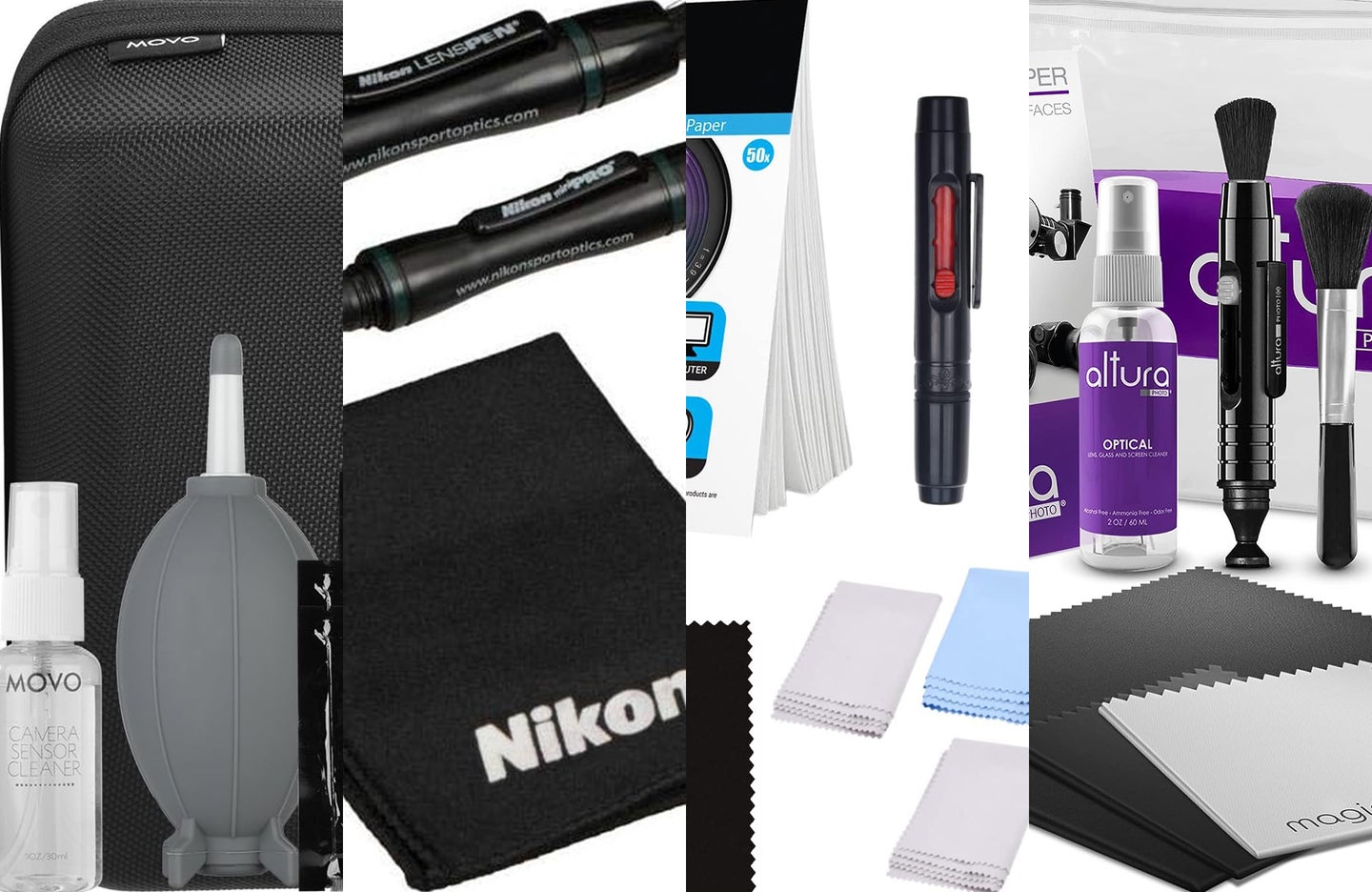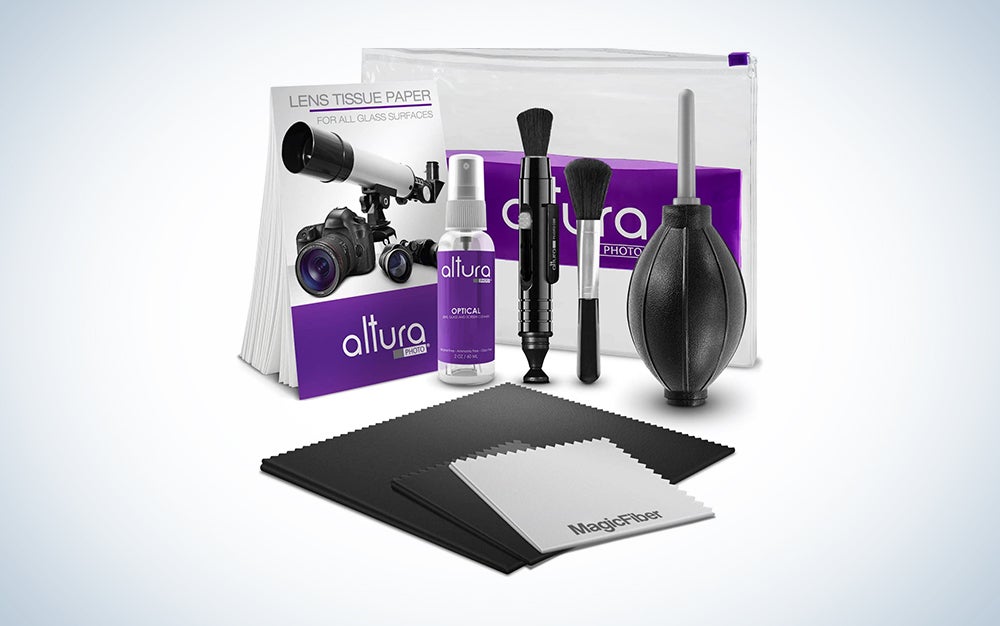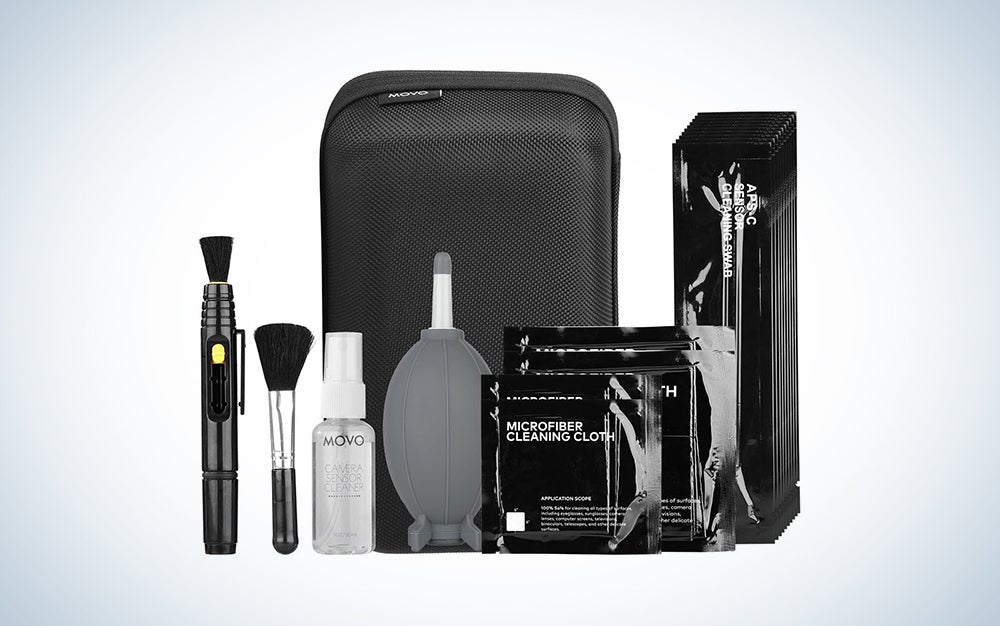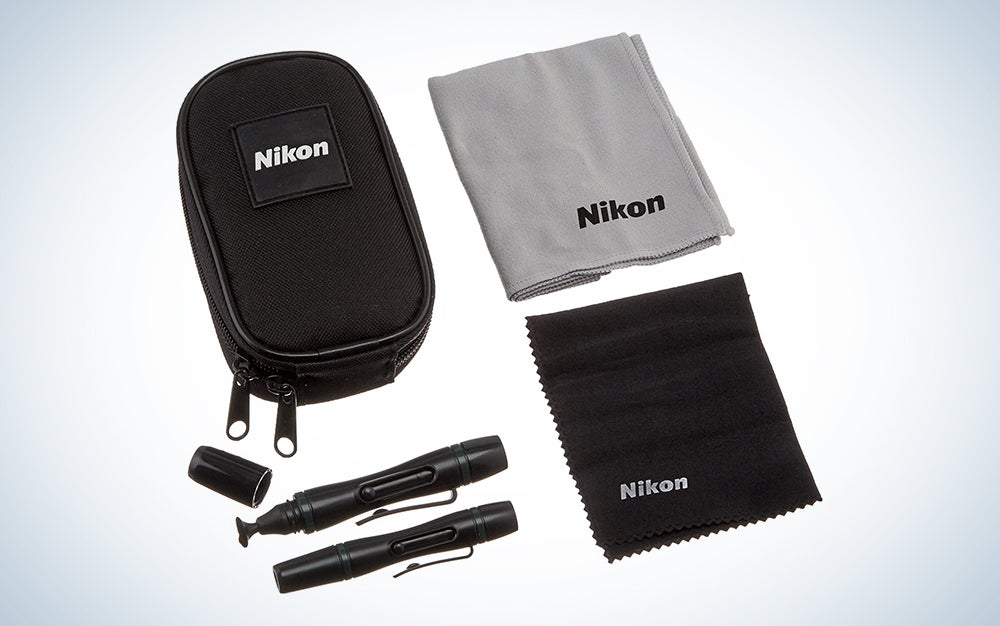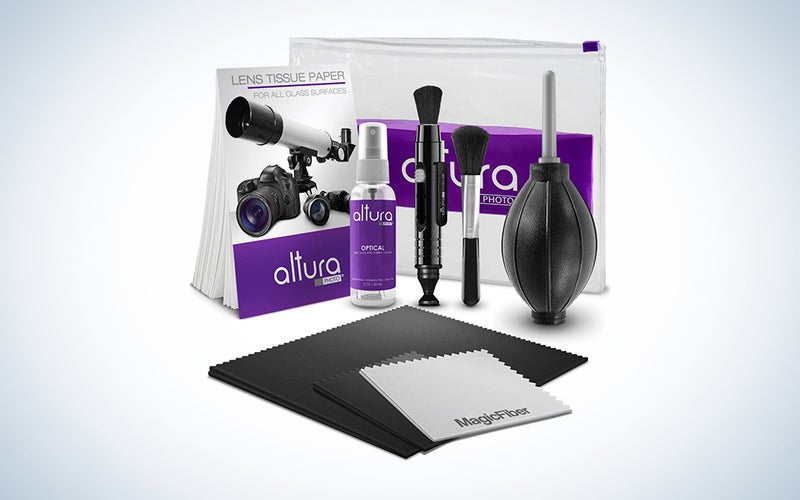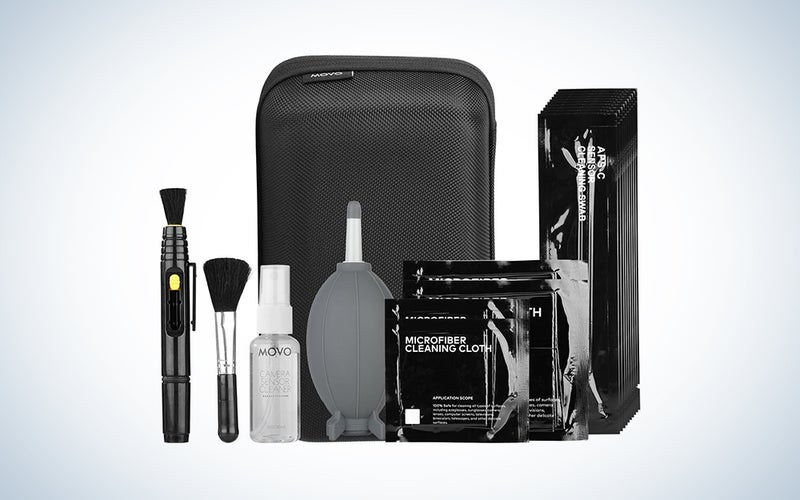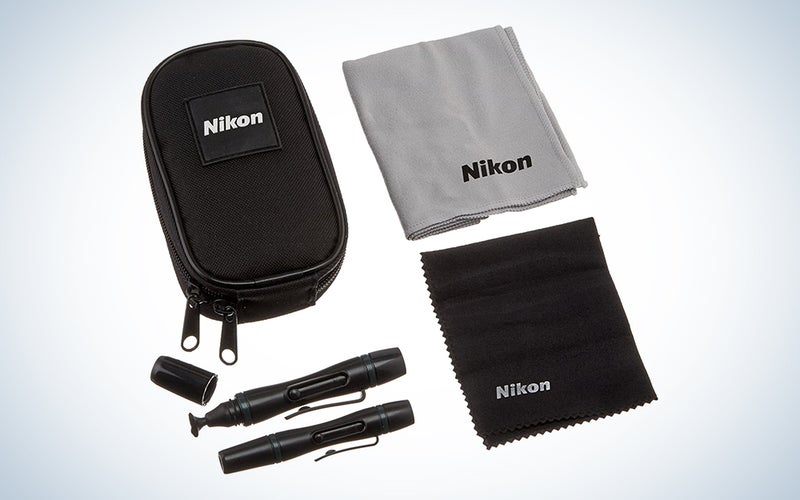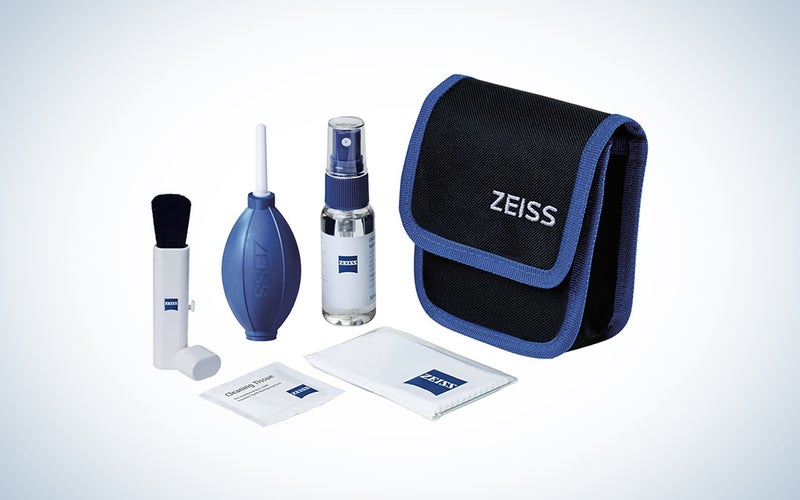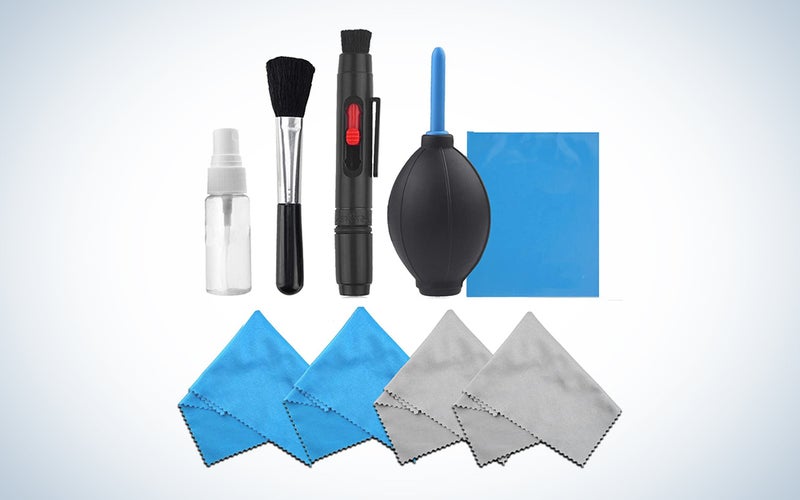We may earn revenue from the products available on this page and participate in affiliate programs. Learn more ›
Lens cleaning kits are a photographer’s best friend. It might not be as fun or flashy as the latest camera gear, but it’s crucial for capturing great images. No matter how good your composition or how fascinating your subject is, a smudge, fingerprint, or mote of dust can easily ruin your shot. And even though it’s tempting, lenses are expensive and utilize specialized coatings, so you shouldn’t clean them with the corner of your grimy T-shirt. Regular tissues can be just as bad, leaving behind lint that can ruin an otherwise perfect photo. Though they have more specialized tools than the things mentioned above, lens cleaning kits are relatively basic, and it doesn’t take much to use them correctly. Plus, the best lens cleaning kits include everything you need to keep your valuable glass in tip-top shape.
- Best overall: Altura Photo Professional Cleaning Kit for DSLR Cameras
- Best for all-around care: Movo Deluxe Essentials DSLR Camera Cleaning Kit
- Best compact kit: Nikon Lens Pen Pro Kit
- Best for traveling photographers: Zeiss Lens Cleaning Kit
- Best value: Professional Camera Cleaning Kit for DSLR Cameras
How we chose the best lens cleaning kits
The writers and photographers have decades of photography experience and have cleaned countless lenses and cameras. When selecting the best lens cleaning kits, we focused on well-stocked kits that include all the items needed to successfully and thoroughly clean a lens. We also made sure to focus on quality, as lenses are expensive investments, and the last thing you want is for them to get damaged when cleaning. Lastly, cleaning kits need not be costly, so we aimed to find reasonably priced options.
The best lens cleaning kits: Reviews & recommendations
Whether you are looking for a simple solution to bring on your travels or a more robust kit for all sorts of cleaning jobs, the best lens cleaning kits will keep your shots clear and free of any distracting debris on your lens.
Best overall: Altura Photo Professional Cleaning Kit for DSLR Cameras
Amazon
Why it made the cut: It has everything you need to keep your lenses clean, no matter the situation.
Key features
- Includes: 2-ounce bottle of lens cleaning solution, lens tissues, blower, soft brush, lens pen, microfiber cloths
- Carrying case: Yes
Pros
- Includes a 50 pack of lens tissue paper
- Lens cleaner is safe for optics
- cheap
- Three microfiber cloths in different sizes
Cons
- None
Altura’s lens cleaning kit offers all the tools both beginner and advanced photographers need to keep their lenses ready for action. It has three microfiber cloths, lens tissues, cleaning solution, a blower, a lens pen, and an additional soft brush. You’ll be able to clear everything from fingerprints and dust to more stubborn messes like mud.
The clear, zip-lock carrying case makes it easy to ensure nothing’s running low. And it keeps it all in one place, so it’s ready when you need it. You won’t have to search in different pockets to find the one piece of cleaning equipment you’re looking for.
Best for all-around care: Movo Deluxe Essentials DSLR Camera Cleaning Kit
Amazon
Why it made the cut: It’s a very well-stocked cleaning kit for thorough lens cleaning.
Key features
- Includes: Rocket air blower, tin-oxide camera sensor cleaner liquid, APS-C sensor cleaning swab (x10), lens pen, plush cleaning brush, 9 x 9″ microfiber cleaning cloth (x2), 6 x 6″ microfiber cleaning cloth (x2)
- Carrying case: Yes
Pros
- Includes everything you need to clean lenses and your sensor
- Comes in a sturdy case
- Very affordable
- Can be used to clean glasses and other optics as well
Cons
- Only APS-C compatible
- Brush bristles fall out easily
Movo’s lens cleaning kit features everything you need to clean both the lens and sensor, making it a great all-in-one kit. You can even use the wipes to clean your glasses or binoculars as well. And it comes with a semi-rigid, zippered case for sturdy organization. So you won’t need to worry about things falling out or getting dirty.
All of the cloths and swabs are individually wrapped to keep them free of dust. That does, of course, mean that you will need to restock more frequently. It comes with APS-C-sized sensor swabs and sensor cleaning solution. If you have a full-frame camera, you’ll need to get something else to clean your sensor, but the rest of these components will work fine for your camera.
Best compact kit: Nikon Lens Pen Pro Kit
Amazon
Why it made the cut: It’s a simple kit with two different sizes of lens pens and two clothes and comes in a compact, zippered case.
Key features
- Includes: Standard and micro lens pens, microfiber cleaning cloth, dry anti-fog cloth
- Carrying case: Yes
Pros
- Comes with a durable, zippered case
- Cleaning clothes for different types of cleaning
- Two lens pens sizes add versatility
Cons
- Doesn’t include any lens cleaning liquid
Millions of professional and hobbyist photographers worldwide use Nikon cameras and lenses. The company’s lens kit keeps things simple with two lens pens, a microfiber cloth, and a dry anti-fog cloth. It all comes with a sturdy, zippered case that has belt loops.
The kit handles fingerprints, raindrops, and dust nicely, though it won’t provide the more thorough cleaning of a solution or pre-moistened wipes. But the case should be large enough to throw a few wipes in just in case you need them.
Best for travel photographers: Zeiss Lens Cleaning Kit
Amazon
Why it made the cut: Coming from world-renowned optics maker Zeiss, you can trust these cleaning tools will be safe and effective.
Key features
- Includes: Air blower, brush, cleaning solution, 10 individually wrapped pre-moistened lens wipes, microfiber cloth
- Carrying case: Yes
Pros
- Includes pre-moistened wipes
- Comes with a carrying case
- Lipstick style brush keeps it clean
Cons
- Pricey for a cleaning kit
Zeiss is a noted lens manufacturer, so it’s no surprise they’d make a lens cleaning kit. It includes a microfiber cloth in a small pouch, 10 pre-moistened cleaning wipes, a bottle of solution, a blower, and a soft brush. It has everything you need to keep your lens free of smudges and debris.
What makes this travel-friendly kit stand out is the compact pouch designed to be worn on a photographer’s belt. This is convenient for situations when you don’t want to carry a camera bag with you but still want to keep your lenses free of dust and smudges. Zeiss lenses aren’t cheap, however, and neither is their cleaning kit compared to many of the other options out there.
Best value: Professional Camera Cleaning Kit for DSLR Cameras
Amazon
Why it made the cut: It includes plenty of essential cleaning tools and is very affordable.
Key features
- Includes: Lens pen, brush, blower, empty spray bottle, 4 microfiber cleaning cloths, 50 lens cleaning tissues
- Carrying case: No
Pros
- Includes four microfiber cloths and plenty of tissues
- Has a one-year guarantee
- Very affordable
Cons
- Included spray bottle comes empty
- No carrying case
This inexpensive kit includes a lens pen, blower, additional brush, and four microfiber cloths—enough to keep your lenses clean. It also comes with a small spray bottle, but you’ll have to fill that yourself with a lens cleaning solution. Also, the kit doesn’t come with a case, so make sure you find a solution to keep everything organized and clean.
Things to consider before buying the best lens cleaning kits
The best lens cleaning kits are versatile, portable, and economical. You never know what kind of mess you’ll encounter in the field, so always be prepared.
What cleaning tools are included?
Lens cleaning kits come stocked with different types of cleaning materials, with some more well-stocked than others. For most photographers, versatility is key when shopping for a camera lens cleaning kit. You never know whether you’ll be wiping fingerprints off your 50mm f/1.2, blowing the dust off your 18-35 mm f/1.4, or getting mud off the front element of your 70-200mm f/2.8.
For a starter kit, look for one that includes a hand blower, lens tissues, and a microfiber cloth for getting rid of dust. They’re gentle on the glass and easy to use, and much better options than the corner of your shirt or your hoodie’s cuff. Some kits even include multiple packets of tissues or an extra cloth to keep you stocked for longer.
For cleaning fingerprints and smudges, many kits will include a cleaning solution designed to work specifically with the precision optical coatings found on today’s modern lenses. Don’t use eyeglass solution, window cleaner, or any other glass cleaner, or you risk damaging the lens. The liquid solution often comes in a small spray bottle, but some kits also include handy, pre-moistened wipes that you can stow in your pockets. Wipes are quick and disposable, but the spray solution is usually more economical.
More advanced kits include something known as a lens pen, which has a special tip on one end to pick up oil, while the other end features a soft, retractable brush to flick away loose debris.
Used together, these tools cover the afflictions that most commonly strike the lenses of professional and amateur photographers.
Does it come with a case?
A good lens cleaning kit should also include a carrying case. Most are small and compact and are designed to keep these necessary tools of the trade organized and handy when you need them. You’re already juggling a camera, some lights, filters, and any number of other specialized gear. You don’t want to waste time fumbling for cleaning solution while you risk missing out on the perfect shot.
Carrying cases also protect your cleaning supplies and, yes, keep them clean. That microfiber cloth isn’t going to be much good if it accidentally falls out of your bag and lands in some dust. And you don’t want your cleaning solution leaking out and getting on your delicate memory cards.
Some carrying cases for lens cleaning kits include zippers and padding, while others are transparent to help you quickly see what supplies are running low.
The trick is finding a case that’s not too bulky and won’t take up too much space in your camera bag. Some photographers keep a bigger kit in their studio and a more streamlined version in their bag. Pay attention to how you like to travel, pack your photography equipment, and how much physical activity is involved in your shoots when thinking about which case style works best for you.
Price
When it comes to lenses, you often get what you pay for. Exceptions abound, but high-quality, well-built lenses with superior optics don’t come cheap. Thankfully, maintaining them is a much less expensive proposition. Even the best lens cleaning kits aren’t particularly expensive. Don’t be afraid to spend a little less on simple kits if they still provide the cleaning options you need.
Keep in mind, however, that lens cleaning kits are, by their nature, disposable. Cleaning fluid and tissues get used up, and microfiber clothes get dirty or wear out. So while they aren’t pricey, you will need to refill supplies.
How to clean your lenses properly
Believe it or not, it is possible to overclean your lenses. Modern lenses have precision chemical coatings to help reduce flare, diffraction, and other optical issues that get in the way of a good photo or video. Overcleaning can wear down these coatings, which will impact performance. So, you need to be sure to clean your lenses appropriately with the right equipment.
First, though, make sure you store lenses properly, with covers over both the front and rear elements, to help keep them clean. Then, when you pull one out, use the squeeze blower to remove any loose dust or particles. Finally, check the lens carefully—do you see any fingerprints or smudges? If so, by all means, break out the cleaning solution. But if not, leave it alone.
Before using a microfiber cloth, check it for dust and debris before using it on your lens. Keep the cloth somewhere safe when not in use, so it stays clean; throwing it in the bottom of your bag, where it will collect dust and debris, will not result in very effective cleaning. And replace it if it starts to fall apart. Keeping a spare in your camera bag is never a bad idea.
When using a camera lens cleaning solution, remember to apply it to your microfiber cloth or tissue and never directly to the lens. You don’t want to risk it seeping inside the lens housing. Start cleaning your lens from the center, work toward the edge, and avoid applying too much pressure. You don’t want to scratch the glass or coating accidentally.
Lastly, don’t forget the rear element on your lens. Again, a few puffs of air and a gentle wiping with a microfiber cloth will usually do the trick. The same goes for the lens mount, which has small grooves and can often trap debris. One last note: Avoid those canisters of compressed air. They’re much too powerful and are likely to blow debris into your camera’s lens, and the fluids and chemicals in compressed air can damage your optics.
FAQs
Q: What are the benefits of using a lens cleaning kit?
The best lens cleaning kits will come with all the different tools you need to clean your lens, no matter the situation. That makes it very convenient as you won’t need to source a bunch of individual items. Many also come in a dedicated case, which helps keep you organized, makes it easy to grab and go, and prevents your cleaning tools from getting damaged or dirty.
Of course, different kits come stocked with various items, so depending on what you purchase, you may still need to buy additional, separate pieces. Also, the items in kits will need to be replaced at some point, at varying rates, so you may still find yourself purchasing individual pieces down the line anyway.
Q: How do you clean a camera lens with a cleaning kit?
Start by using a squeeze blower to gently blow debris from the glass elements. If there are more stubborn pieces of dust, use a soft brush. You can follow this up by gently wiping with a microfiber cloth or lens tissue.
If you notice fingerprints or oily smudges, use a cleaning solution designed for modern lenses. Remember to spray it on the cloth, not directly on the lens. Always start cleaning in the center of the lens and work your way out. Finally, let it air dry for a moment, and it’ll be ready to use. And remember, be gentle and don’t clean your lenses too often.
Q: How do I clean the inside of my lens?
Sometimes dust can get inside the body of a lens; it might be visible behind the glass element or further down inside. Unfortunately, if your lens has an internal problem, you’ll need to take it to a qualified professional for repair and cleaning. Lenses are complicated and delicate pieces of camera gear, and you shouldn’t try taking one apart if you don’t know exactly what you’re doing. You run the risk of permanently damaging it. Replacing the lens is often much more expensive than letting a pro clean it in the first place.
Q: What are the different parts of a lens cleaning kit?
Lens cleaning kits will come with different items. But, for the most part, they will include a bulb blower, a soft brush, microfiber cloths, and a lens cleaning solution. Some may also come with pre-moistened, individually wrapped lens cleaning wipes or a lens pen.
Q: How often should you clean your camera lens?
How often you should clean your lens depends on how often you are using it and the type of environment you are using it in. For example, if you only take your lens out once in a blue moon, you won’t need to clean it as much as someone who uses it daily. And if you strictly do in-studio portrait work, you won’t have to worry as much about cleaning as someone taking a lens on backcountry hiking trips.
That said, it’s always a good idea to blow or wipe off the front element before every shoot to ensure there isn’t anything there to impact your images negatively. I have had photographers turn in photos only to see giant smudges clouding a corner of all the shots. Broadly speaking, we suggest a more in-depth cleaning a few times a year if you use your lens regularly.
Final thoughts on the best lens cleaning kits
- Best overall: Altura Photo Professional Cleaning Kit for DSLR Cameras
- Best for all-around care: Movo Deluxe Essentials DSLR Camera Cleaning Kit
- Best compact kit: Nikon Lens Pen Pro Kit
- Best for traveling photographers: Zeiss Lens Cleaning Kit
- Best value: Professional Camera Cleaning Kit for DSLR Cameras
The best lens cleaning kits are essential camera accessories for any photographer, regardless of their level. They should be kept inside a camera bag as a matter of course. Using a cleaning kit is one of the best ways to keep your lenses performing like new so they can bring you years of enjoyment as you pursue your art. But cleaning supplies won’t do you any good if you don’t get in the habit of using them—so remember to check your lenses every time you remove the cap.
Why trust us
PopPhoto has a long history of delivering the opinions of some of the sharpest and most prolific camera dorks the world has to offer. Since 1937, we’ve been reviewing cameras, providing wisdom from well-known photographers, and generally just nerding out about all that goes into making great pictures. Our current crop of writers and editors have decades of professional photography and camera writing experience among them. Collectively, we’ve probably shot with just about every camera and lens combo you can imagine—as well as some obscure stuff you may not even know about. Remember the Casio Tryx folding camera? PopPhoto does.
We also get that buying a camera is a big decision, which is why we’re dedicated to helping folks choose the right one (or, in our case “ones”) for their needs. Case in point: Handing over top dollar for an expensive rig may leave you unsatisfied if it doesn’t fit your preferred shooting style. Sure, a $6,000 sports-oriented DSLR can capture landscapes, but do you really need to do it at 30 frames-per-second? No, you don’t.
